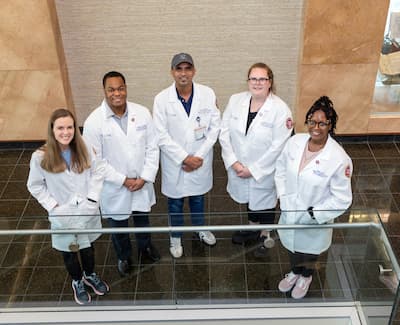Graduate Program
- Department of Physiology
- About Physiology and Biophysics
-
Education
- Melissa and Pete Shepherd, Jr., PhD New Investigator Prize
- Physiology and Biophysics Educational Programs Home
- Graduate Program
- Undergraduate Research Experience
- Seminar and Lecture Series
- Seminar Series Archives
-
Research
- 2026 Publications
- 2025 Publications
- Physiology and Biophysics Research Home
- Core Facilities
- Programs
- Graduate Program Research
- Publications
- Research Links
- Resources
Graduate Program in Physiology and Biophysics
With the explosion in technology for studying health and disease at the cellular, molecular and genetic levels, it is the task of the modern physiologist to integrate that information to understand function at the whole organism level. This integration brings into focus the multiple mechanisms that contribute to the myriad functions of the body in health and disease.
About the program
In keeping with the mission of the University of Mississippi Medical Center, the Department of Physiology and Biophysics maintains an active and productive role in teaching, research, and service to the medical center and to the national and international community. Extramural funding for the department, primarily from the National Institutes of Health (NIH) and the American Heart Association (AHA), totals approx.- $12,000,000/year.

The department is home to an NIH-funded Center of Biomedical Research Excellence, the Mississippi Center for Clinical and Translational Research, and two NIH-funded training grants that support graduate students, postdoctoral fellows, and undergraduate students who are underrepresented minorities. In addition to these major programs, the faculty members are nationally recognized researchers, and play leading roles in national and international service to the American Physiological Society, the American Heart Association, the American Heart Association Council on Hypertension, National Institutes of Health, the International Society of Hypertension and the Inter-American Society of Hypertension.
The Department of Physiology offers a PhD in Physiology and supports an MD/PhD degree in Physiology.
For the PhD degree, a minimum of 60 credit hours in physiology and biomedical science courses is required. At least 15 of the 60 credits must be outside the major area of study. In addition, at least one first-author original research publication and a dissertation are requisites for the PhD. Our PhD students are fully financially supported throughout their training, receiving a full tuition scholarship, student healthcare, and a living stipend of $28,000 per year.
The MD/PhD degree is offered to highly qualified students by the School of Medicine in collaboration with the School of Graduate Studies in the Health Sciences. This program is designed primarily to train physician scientists who seek a professional career combining clinical skills and research.
For a list of prerequisites and an application, click here.
For more information
- Dr. Josh Speed
Associate Professor
Director of Graduate Studies
jspeed@umc.edu - Dr. Erin Taylor
Assistant Professor
Director of Graduate Studies
ertaylor@umc.edu


